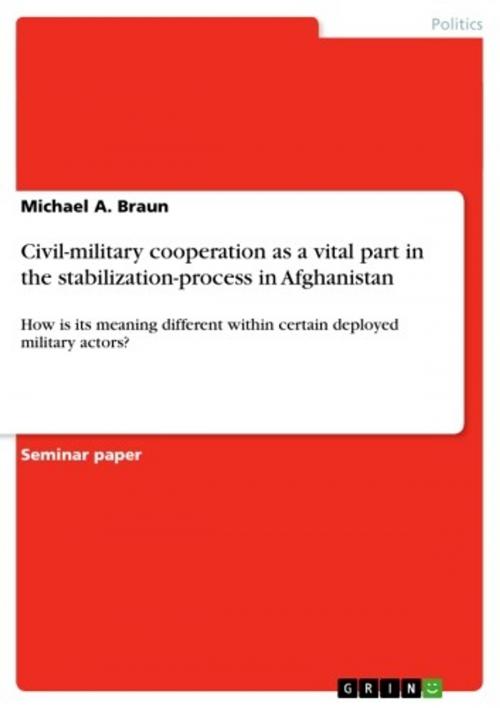Civil-military cooperation as a vital part in the stabilization-process in Afghanistan
How is its meaning different within certain deployed military actors?
Nonfiction, Social & Cultural Studies, Political Science, International, International Security| Author: | Michael A. Braun | ISBN: | 9783640190102 |
| Publisher: | GRIN Publishing | Publication: | October 16, 2008 |
| Imprint: | GRIN Publishing | Language: | English |
| Author: | Michael A. Braun |
| ISBN: | 9783640190102 |
| Publisher: | GRIN Publishing |
| Publication: | October 16, 2008 |
| Imprint: | GRIN Publishing |
| Language: | English |
Seminar paper from the year 2005 in the subject Politics - International Politics - Topic: Peace and Conflict Studies, Security, grade: 2,1, University of Potsdam (Lehrstuhl für internationale Politik), course: State Failure, Crisis and Conflict Management, 32 entries in the bibliography, language: English, abstract: When policy makers from developed countries gather 'to form the world', for a long time military forces were seen as the only ones of impact in areas of war and crisis. They were massively funded and specifically equipped to fulfill their tasks for the best possible outcome. But over the last decades civilian, mostly non-governmental, actors did show up for nation-building as well. These organizations eventually demanded the right to participate - and than had to deal with urgent reconstruction issues as well. For this the question is how these - civilians and military personnel - work and win 'wars' together when they have to. Based on Afghanistan, the pa-per points on the ever more used concept of civil-military cooperation from the perspective of the military. To gain insight, four different approaches (UN, NATO, US, Germany) are de-scribed and explained. The context of the paper is formed by background-information on the current missions in Af-ghanistan, Operation Enduring Freedom and International Security Assistance Force. And to get an impression of the cooperation, the paper overlooks the successful Provincial Recon-struction Teams. The hypothesis of the paper is that successful civil-military cooperation is assumed to be a vital part in the stabilization-process in Afghanistan. This is due to the broad meaning that the different deployed actors put onto it. And, especially the featured military forces / bodies have changed within the last decade.
Seminar paper from the year 2005 in the subject Politics - International Politics - Topic: Peace and Conflict Studies, Security, grade: 2,1, University of Potsdam (Lehrstuhl für internationale Politik), course: State Failure, Crisis and Conflict Management, 32 entries in the bibliography, language: English, abstract: When policy makers from developed countries gather 'to form the world', for a long time military forces were seen as the only ones of impact in areas of war and crisis. They were massively funded and specifically equipped to fulfill their tasks for the best possible outcome. But over the last decades civilian, mostly non-governmental, actors did show up for nation-building as well. These organizations eventually demanded the right to participate - and than had to deal with urgent reconstruction issues as well. For this the question is how these - civilians and military personnel - work and win 'wars' together when they have to. Based on Afghanistan, the pa-per points on the ever more used concept of civil-military cooperation from the perspective of the military. To gain insight, four different approaches (UN, NATO, US, Germany) are de-scribed and explained. The context of the paper is formed by background-information on the current missions in Af-ghanistan, Operation Enduring Freedom and International Security Assistance Force. And to get an impression of the cooperation, the paper overlooks the successful Provincial Recon-struction Teams. The hypothesis of the paper is that successful civil-military cooperation is assumed to be a vital part in the stabilization-process in Afghanistan. This is due to the broad meaning that the different deployed actors put onto it. And, especially the featured military forces / bodies have changed within the last decade.















